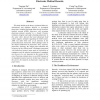Free Online Productivity Tools
i2Speak
i2Symbol
i2OCR
iTex2Img
iWeb2Print
iWeb2Shot
i2Type
iPdf2Split
iPdf2Merge
i2Bopomofo
i2Arabic
i2Style
i2Image
i2PDF
iLatex2Rtf
Sci2ools
122
click to vote
HICSS
2007
IEEE
2007
IEEE
Paper versus Electronic: Challenges Associated with Physicians' Usage of Electronic Medical Records
This study builds on the theory of planned behavior, institutional and diffusion theories to investigate physicians’ attitudes and usage behaviors of electronic medical records (EMR). Interviews with seventeen physician-residents enrolled in a Family Practice residency program and eight attending physicians in the same clinic showed that most physicians held rather negative attitudes regarding the EMR system. EMR was often times seen as an intrusion in the patient-physician interaction. Other findings relate to the impacts EMR had on physicians’ time, expertise, physicians’ learning, the length (and sometimes the accuracy) of the clinical notes. Challenges associated with behavioral control issues such as availability of computers and the physical positioning of computers are shown to be very important in the context of this case. Physician-residents have to use EMR because of its mandatory nature, however, if they had a choice or the power, the majority of physicians would use ...
Related Content
| Added | 02 Jun 2010 |
| Updated | 02 Jun 2010 |
| Type | Conference |
| Year | 2007 |
| Where | HICSS |
| Authors | Virginia Ilie, James F. Courtney, Craig Van Slyke |
Comments (0)

